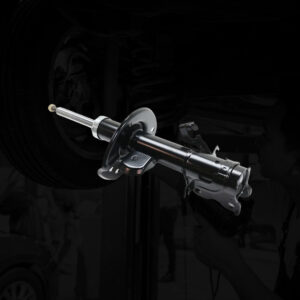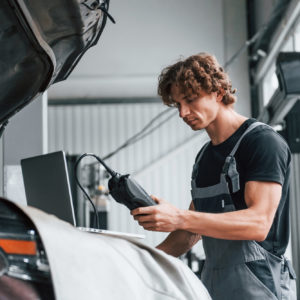Driveshafts are sturdy components, and they’re specially engineered to last a long time. Some vehicle transmission systems have carrier bearings and support.
Over time, some of its bearings may become damaged or fail. In this article, we’ll talk about what the driveshaft support bearing is and when it needs to be replaced.
What Is a Driveshaft Bearing?
The driveshaft support bearing, which is also called the carrier bearing, is commonly found on two-piece driveshafts. This bearing has a rubberized material that’s engineered to reduce vibration. It is designed to help carry the weight of the driveshafts, keep them aligned, and secure them to the chassis.
The assembly needs to be securely bolted to the bottom of the vehicle. This will allow the inner race of the bearing to move freely without the driveshaft being unstable. It prevents a two-part driveshaft from spinning and flexing while your vehicle is running.
Bad Carrier Bearing Symptoms
Like most joints and bearings, carrier bearings aren’t immune to wear. Here are some of the signs to watch for that can indicate it’s time to have your carrier bearing checked:
Vibrations
A loose or worn carrier bearing can cause unusual vibrations during acceleration. That’s because speeding up the vehicle causes the driveshaft to spin faster. So if the bearing is loose or if its damping material is worn, it’ll create vibrations that become more noticeable when you depress the accelerator pedal.

A misaligned driveshaft can also cause a similar issue.
Clunking and Banging Noise
Aside from vibrations, you may also hear different types of noises once your carrier bearing goes bad. For example, you might hear a clunking sound if the bearing’s rubberized damper is severely worn or damaged. Once the housing or the damper is completely damaged, expect to hear a banging noise that’s impossible to ignore.
Howling and Growling Noise
If you hear a howling or growling noise when your vehicle is speeding up, it can mean that the bearing part of your driveshaft assembly has already failed. Visit an auto repair shop as soon as you notice an unusual noise coming from underneath your vehicle. If it isn’t the bearing, a mechanic would be able to determine the faulty part.
What Causes Driveshaft Bearings to Go Bad?
A driveshaft’s carrier bearing can fail due to several reasons. One cause is improper carrier bearing installation. If the carrier bearing isn’t properly aligned, the stress will take its toll on the bearing itself, causing it to fail. A road accident can also damage your vehicle’s internal bearings. Make sure to have your driveshaft inspected by a professional after a collision.
Your driveshaft bearings can also get faulty due to bad u joints. A problem with your differential can also cause bearing issues—especially if it’s causing the driveline to ride incorrectly. Issues with your transmission can also cause your bearings to fail.
A problem with your differential can also cause bearing issues—especially if it’s causing the driveline to ride incorrectly. Issues with your transmission can also cause your bearings to fail.
–Anthony Harlin, ASE Certified Master Automobile Technician
How Long Do Driveshaft Bearings Last?
Ideally, driveshaft bearings are designed to last for around 100,000 miles. However, this isn’t always the case. Your ride’s driveshaft is exposed to a lot of stress and impact, so it’s normal for the bearings in this area to wear over time.

Remember that these are just estimates. The exact cost will depend on many factors like the specific vehicle that you own, the brand you choose, and the labor rates that apply in your area. Consider taxes and other related repairs as well.
Can I Replace the Driveshaft Bearing On My Own?
Replacing a driveshaft bearing can be complicated. The repair can require special tools that might not be readily available at home. At times, you’ll need to have your driveshaft balanced at a driveline shop.
Take note that you can’t just replace your bearings on some vehicles. In this case, you’ll need to replace the driveline.
Can I Drive With a Bad Carrier Bearing?
No. It’s not recommended. A bad carrier bearing can cause issues with your ride’s differential, transmission, and driveshaft. For example, a damaged center support bearing can flex the driveshaft and cause it to come into contact with the underside of your vehicle. Instead of replacing just the bearing, you may have to spend on costly repairs if you let the worst happen. Visit a mechanic right away once you notice any of the symptoms mentioned above.
What to Consider When Shopping for Driveshaft Bearings
Although there are a lot of aftermarket driveshaft bearings available on the market, it can be overwhelming to choose which one to buy. Here are some things to consider when choosing driveshaft bearings:
Compatibility
The first thing you’ll have to consider is compatibility. Check the specifications of the bearing. If you’re shopping from an online site, you’ll usually find this information in the product details portion of the page. If you’re not sure which bearing to buy, you can consult a trusted mechanic.
Brand
Plenty of aftermarket brands manufacture OE-quality driveshaft bearings. If you don’t have a brand you trust, you can check out product review pages. These pages usually give you information about how a certain component or part worked for other customers.
Affordability
High-quality bearings don’t necessarily have to be priced high. There are many top-notch bearings sold at competitive prices. You just have to know where to look.
Driveshaft bearings play a crucial role in the overall operation of your vehicle. That’s why it’s vital to have it replaced as soon as you find out that it’s faulty.
Get New Driveshaft Bearings Online
It’s normal for bearings to wear out after a certain period. They’re responsible for allowing a certain component to rotate while bearing some weight. The ball bearings and rings will eventually have imperfections that can create noises, which indicate that they might fail in the future. Don’t ignore your vehicle’s worn-out driveshaft bearing. Get a replacement here at CarParts.com!
CarParts.com is a one-stop shop when it comes to aftermarket parts, which include driveshafts and driveshaft bearings. Many mechanics and industry experts have faith in our parts, as we source them from leading brands. Our components are made with the latest manufacturing techniques and have passed stringent quality standards.
Getting parts from us won’t break the bank either, as we pride ourselves on our competitive prices. So, what are you waiting for? Shop for a replacement driveshaft bearing today.
Any information provided on this Website is for informational purposes only and is not intended to replace consultation with a professional mechanic. The accuracy and timeliness of the information may change from the time of publication.






























